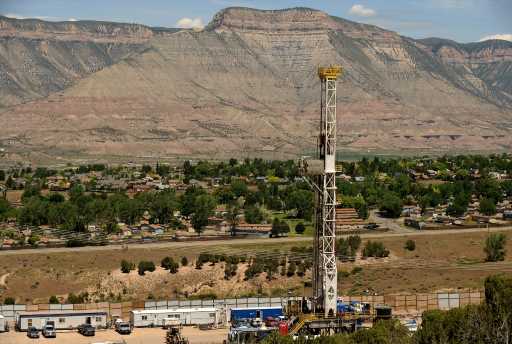Colorado takes over 106 oil, gas wells from two companies facing violations
State regulators are taking over a combined 106 wells from two oil and gas companies that faced several alleged violations and a total fine of $2.2 million.
The Colorado Oil and Gas Conservation Commission voted to suspend the fine. But the commission revoked the ability of the companies, 31 Operating and Lasso Oil and Gas, to operate in Colorado.
The wells, mostly in Rio Blanco County, will be put on the state’s orphan-well list and closed and cleaned up with money in a state fund that uses revenue from fees on the industry and federal dollars.
Kelly Rosenberg, the COGCC enforcement officer, said in a recent meeting that the alleged violations stretch back to 2018 and haven’t been cleared up.
“Staff feels it is in everybody’s best interest if Lasso and 31 Operating simply stop operating and allow the state to manage their wells. The expectation is all the remaining wells will be placed on the orphan-well list,” Rosenberg said.
Among a series of new rules approved by the COGCC is increased funding for orphaned wells, ones whose owners can’t be found or are left without being properly shut down and reclaimed.
Other new rules changed requirements for the bonds and other financial assurances that companies must provide as a guarantee they’ll clean up and restore well sites. Colorado’s previous requirements were seen as too low to deter companies from just walking away.
The latest information from the COGCC shows there are 528 orphaned wells and 981 associated sites in Colorado. The state estimates it costs on average $82,500 to plug and reclaim an orphan well, although environmental organizations contend it can cost well above $100,000 per site.
Lasso, which was accused of violating 12 state rules, including failing to clean up a spill, allowing the venting or flaring of emissions and failing to maintain a wellhead. The COGCC foreclosed on the company’s $125,000 in bonds.
The COGCC staff said 31 Operating violated seven rules, including not having adequate secondary containment tanks and not submitting required records. The company transferred about 100 wells to a third operator, but relinquished 62 of its wells and $95,000 in bonds.
Lasso and 31 Operating are separate companies, but are listed at the same Texas address and have the same official representative in Colorado. The representative would have to seek approval from the COGCC before getting involved with another oil and gas business in Colorado and would have to pay the $2.2 million fine.
Commission member John Messner questioned why the fine was suspended.
“I’m trying to understand what other remedies may be available here,” Messner said. “We are suspending a $2 million penalty and taking on an operator’s entire portfolio of assets that they are clearly walking away from because they are unable to operate in the state of Colorado in a manner that’s protective.”
Rosenberg said the staff believed the agreement was the best way to reach a resolution in the case. The parties were able to transfer 100 wells to another company, keeping them off the state’s orphan-well list, she said.
“I just don’t think we would have been able to get the operators to sign off had we imposed the $2 million penalty,” Rosenberg said.
Messner joined the other commissioners in voting for the agreement even though he said it gave him “heartburn.”
“It sure seems like a get-out-of-jail-free card,” Messner said.
Zachary Grey, an attorney representing the two companies, said during a June 29 COGCC meeting that the staff and its counsel “present certain facts through its perspective that perhaps my clients don’t necessarily agree with.”
Grey declined to comment further when contacted Thursday.
Last week, the COGCC approved an orphan-well fund as directed by a law approved this year. The per-well fees paid by oil and gas operators are expected to generate $10 million annually.
Colorado also expects to receive $10 million to $15 million annually from the federal Infrastructure Investment and Jobs Act to close and clean up wells and restore disturbed land. The COGCC said altogether, the fund will likely total $100 million to $115 million over the next five years
Source: Read Full Article


